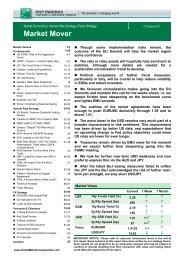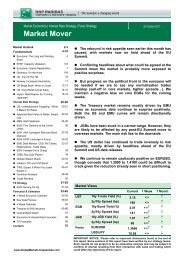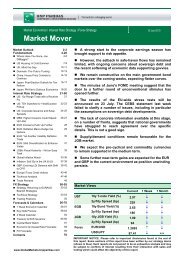Market Economics | Interest Rate Strategy - BNP PARIBAS ...
Market Economics | Interest Rate Strategy - BNP PARIBAS ...
Market Economics | Interest Rate Strategy - BNP PARIBAS ...
Create successful ePaper yourself
Turn your PDF publications into a flip-book with our unique Google optimized e-Paper software.
5.0%. Even for 2012, while the headline median<br />
consensus forecast is stuck at the 4.5% mark, the<br />
average forecast has already started to increase.<br />
This suggests that the distribution of individual<br />
forecasts in the sample is biased to the right-hand<br />
side. Dangerously, if the official inflation target<br />
becomes increasingly perceived as a floor rather<br />
than a central policy goal, it may quickly loose its<br />
relevance as an effective anchor for longer-term<br />
expectations too.<br />
On recent trends, and without a convincing policy<br />
response, inflation could well start to threaten the<br />
6.5% target ceiling. In that scenario, it would not be<br />
unconceivable to start hearing talk about inflation<br />
going above 7.0%.<br />
After all, domestic demand is surging and resource<br />
utilisation in the economy is high. Brazil’s local credit<br />
conditions are supportive, consumer confidence has<br />
soared to all-time highs and labour markets are very<br />
tight. The unemployment rate keeps reaching all-time<br />
lows and nominal wage growth has accelerated into<br />
double digits.<br />
Fiscal promises, FX concerns<br />
The worsening inflation picture argues for a prompt,<br />
decisive policy response. Fiscal policy is too<br />
expansionary, including through quasi-fiscal stimulus<br />
via aggressive credit extension at subsidised rates by<br />
the national development bank (BNDES). While the<br />
authorities have pledged to pursue more disciplined<br />
fiscal policies, the challenge is to turn words into<br />
action. Sadly, the recent policy track record does not<br />
inspire much confidence, and observers remain<br />
sceptical on whether authorities will walk the fiscal<br />
talk. The recent reliance on accounting devices to<br />
achieve official fiscal goals does not bode well for<br />
fiscal credibility.<br />
In the absence of sufficient fiscal tightening, the<br />
burden of adjustment falls on monetary policy. As<br />
noted above, macro-prudential measures such as<br />
higher reserve requirements and credit restrictions<br />
are no substitute for rate hikes, given differences in<br />
the reach and transmission channels of these<br />
alternative policy tools. In fact, international<br />
experience suggests that macro-prudential policies<br />
can prove self-defeating if they turn out to be a thinly<br />
disguised excuse to avoid needed policy tightening. It<br />
may be fashionable in international circles to talk<br />
about macro-prudential policies, but there is no<br />
substitute for effective policy tightening.<br />
What about the currency? Today’s reluctance among<br />
policymakers across emerging markets to let their<br />
currencies appreciate can complicate monetary<br />
policy. Brazil’s recent measures to curb capital<br />
inflows call into question the role of currency<br />
appreciation as a relevant channel for monetary<br />
policy to have an impact on inflation. With the<br />
currency channel partially blocked, do policies then<br />
need to be tightened more than otherwise in order to<br />
achieve the same end-result? In all, as long as<br />
capital inflows remain strong but authorities resist<br />
currency appreciation, emerging-market monetary<br />
policymakers will continue to face a policy ‘trilemma’<br />
if they try to target inflation and currency at the same<br />
time while still living with capital flows. Something<br />
has to give.<br />
Monetary policy action: how bold?<br />
It is high time monetary policy responded to rapidly<br />
deteriorating inflation dynamics. Now under a new<br />
administration, Brazil’s central bank has a unique<br />
opportunity at its inaugural policy Copom meeting on<br />
19 January to rescue its inflation-fighting credentials<br />
with bold action. While a 50bp rate hike is widely<br />
expected, the policy signal would be much stronger<br />
with a larger hike (say 75bp or even 100bp), if<br />
coupled with an unambiguously firm and explicit<br />
commitment to do whatever it takes to bring inflation<br />
back to the target in a timely manner. We trust the<br />
central bank understands what is at stake, but<br />
observers are uncertain whether there is sufficient<br />
latitude for autonomous monetary policy action.<br />
In addition, monetary policy across many emerging<br />
markets seems more expansionary (on currency<br />
fears) than domestic demand considerations alone<br />
would dictate. That raises the issue of whether or not<br />
individual central banks in emerging markets feel<br />
they can be more lenient as peers elsewhere also<br />
seem more willing to accommodate higher inflation<br />
than usual.<br />
One risk in Brazil is that inflation dynamics have<br />
worsened to such a degree that a 50bp rate hike at<br />
this stage might not be enough to re-anchor inflation<br />
expectations. After all, given the usual policy time<br />
lags and the pipeline inflation pressures that have<br />
been building, inflation may rise significantly higher<br />
before it starts to decelerate.<br />
If the central bank is regarded as remaining behind<br />
the curve, the concern is that domestic demand<br />
would remain too hot for too long and inflation<br />
pressures would build further. In that scenario,<br />
inflation would eventually get to a point that ultimately<br />
forces a more aggressive policy reaction.<br />
A back-loaded policy path would likely mean that<br />
rates would have to peak higher than otherwise,<br />
thereby increasing the risks of eventual overtightening<br />
and a resulting boom-and-bust growth<br />
pattern.<br />
Marcelo Carvalho 13 January 2011<br />
<strong>Market</strong>s Mover<br />
24<br />
www.Global<strong>Market</strong>s.bnpparibas.com

















